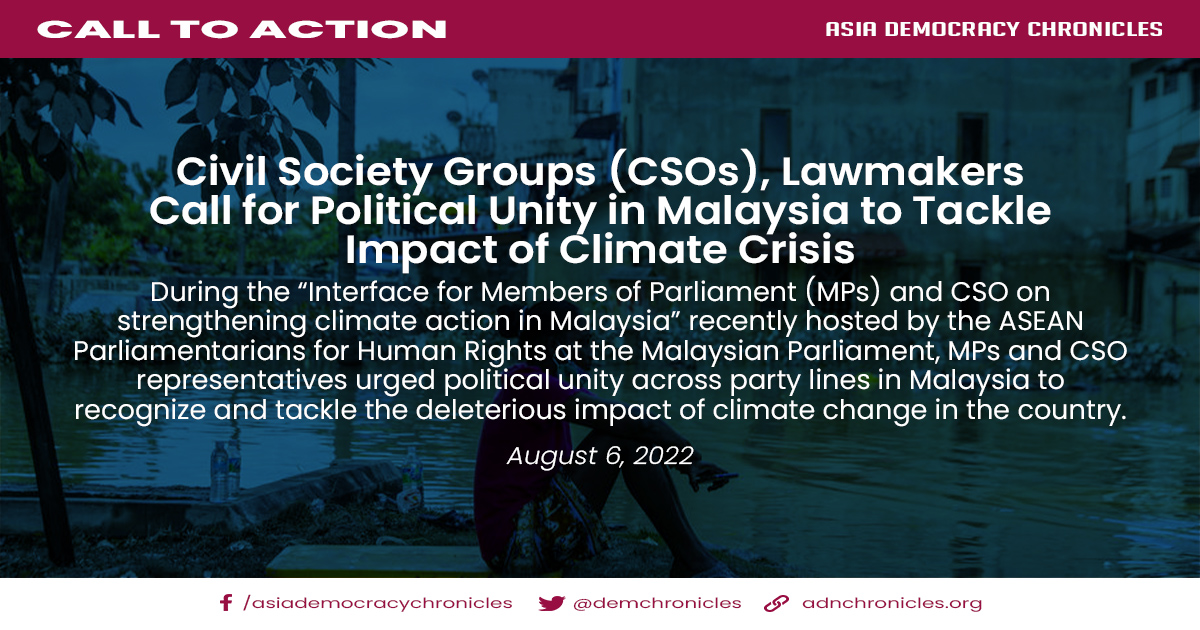|
Getting your Trinity Audio player ready...
|
6 August 2022
JAKARTA – Malaysia urgently needs political unity across the board to recognize and tackle the deleterious impact of climate change in the country, Members of Parliament (MPs) and representatives of civil society organizations said during an event hosted by ASEAN Parliamentarians for Human Rights (APHR) at the Malaysian Parliament on 1 August 2022.
The “Interface for Members of Parliament and Civil Society Organizations on strengthening climate action in Malaysia” brought together 11 MPs and seven CSO representatives for an open discussion on the harmful impacts and causes of climate change in their communities, and the measures required to push for more coordinated and effective solutions.
To strengthen climate action in Malaysia, political unity across party lines is more urgent than ever because climate change is not a local or party issue. No single constituency is immune from its effects, as seen in the flood disaster in December 2021 that affected eight states, resulting in the loss of at least 54 lives.
All the participants recognized that the climate emergency affects all Malaysians, but not in equal measure: the rights of marginalized and vulnerable groups are often more adversely affected. Stronger protection measures for these groups are needed in any proposed national legislation and policy on climate. Professor Emeritus Datuk Dr. Shad Saleem Faruqi recommended parliamentarians to push for the recognition of the human right to a healthy environment in the Constitution of Malaysia, urging Members of Parliament to remember that “human rights do not belong to you and me only, they also belong to the next generation.”
“MPs must work together to use our budgetary oversight to ensure that the national budget is providing sufficient funding to address the adverse impact of climate change,” said Charles Santiago, Malaysian MP and Chair of APHR, as budgetary issues were identified as one of the critical gaps on climate action by the attendees.
The issues discussed included assessing to what extent enacted and proposed measures, such as improving the urban draining system to reduce floodings, contribute to climate adaptation or mitigation. MPs advocated for the adoption of a standardized index on “green tagging”, to measure whether the budget helps to attain, or hinder, climate objectives. They also supported a tax on carbon emissions from power producers in Malaysia, in order to raise the capital needed for a just transition away from fossil fuels to clean energy.
For their part, CSO representatives suggested that their work could be improved if they are granted access to official data on the national budget allocation to climate measures. They also urged MPs to institutionalize and expand current budget commitments, including under the ecological fiscal transfer, to enable state governments to protect forest areas.
The representatives also detailed the need for stronger national legislation on key areas: to urgently cut down carbon emissions by stopping deforestation, a moratorium on building more coal power plants, and supporting ecotourism at the state-level. MPs agreed to develop a legislative roadmap that would help them to identify the climate legislation to push for, an institutional framework to make the fight against climate change a priority across all sectors, and an action plan to ensure the government’s accountability.
Both parliamentarians and CSO representatives at the event noted that, in the absence of an existing institutional mechanism for engagement on climate, it was necessary to widen and strengthen this kind of cooperation between CSOs and more MPs across party lines, and Mr. Santiago announced that a similar meeting between MPs and CSOs will be held in September, before the next Parliament session. #



















